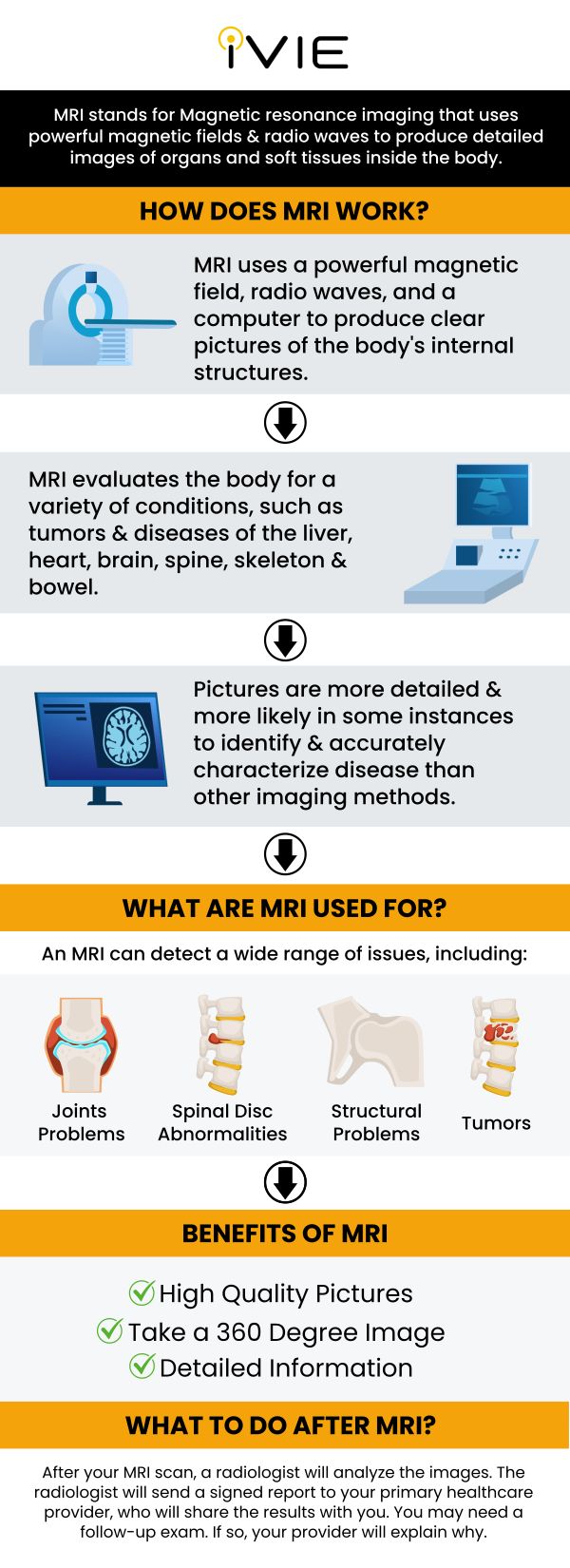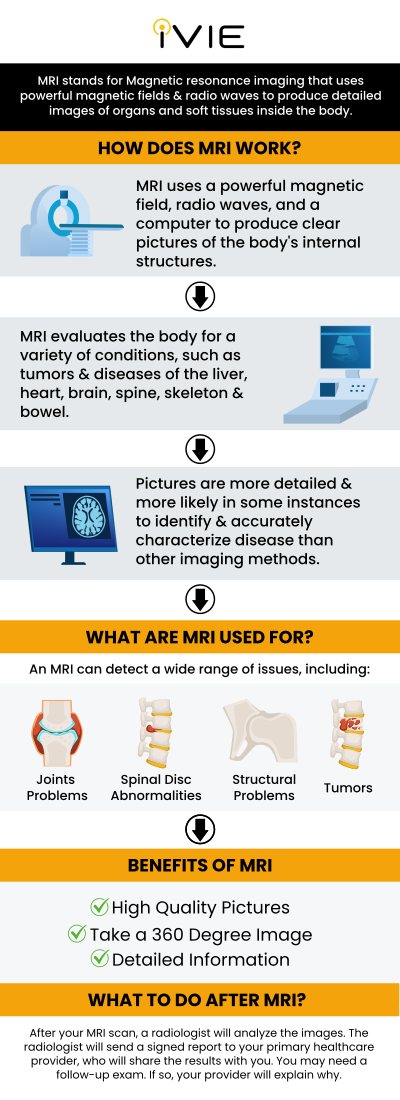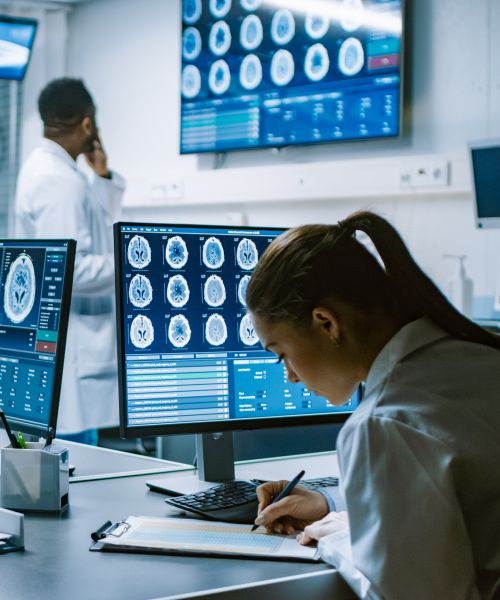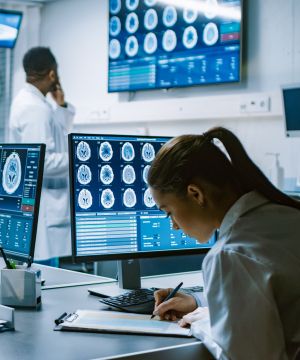Early Brain Health Detection: Why MRIs Are Crucial for Assessing Cognitive Function
Early detection of brain health issues is key to preventing cognitive decline, and MRIs play a vital role in assessing cognitive function. Dr. Kourosh Naini at iVIE utilizes advanced MRI technology to detect early signs of brain abnormalities, such as changes in structure or function, that could indicate cognitive impairments. For more information, contact us or book an appointment online. We are located at 11600 Washington Pl, Suite 104A, Culver City, CA 90066.


Table of Contents:
What is an MRI, and how does it help assess brain health?
Why is early brain health detection important?
How does an MRI detect cognitive issues or brain disorders?
Can MRIs detect Alzheimer’s or dementia in the early stages?
Our state-of-the-art MRI systems at iVIE leverage powerful magnets and radio waves to align hydrogen protons in the body’s water molecules, generating precise and detailed images of brain anatomy. This capability is crucial for differentiating between various tissue types, identifying abnormalities, and detecting lesions or tumors with exceptional clarity.
In our practice, MRI is indispensable for diagnosing and monitoring a wide spectrum of neurological conditions. Whether identifying structural anomalies like tumors or cysts, assessing the impact of stroke or traumatic brain injury, or tracking degenerative diseases such as Alzheimer’s and multiple sclerosis, MRI provides invaluable insights into the brain’s structure and function. The technology’s ability to reveal changes over time is particularly beneficial for tailoring individualized treatment plans and monitoring progress.
At iVIE, our commitment to utilizing MRI technology underscores our dedication to providing comprehensive and advanced care for neurological health. By integrating sophisticated imaging modalities into our diagnostic arsenal, we enhance our ability to diagnose complex conditions, guide effective treatment strategies, and contribute to the broader understanding of the brain’s intricate workings.
Our approach at iVIE underscores the importance of early detection, particularly for neurological conditions such as Alzheimer’s disease, Parkinson’s disease, and multiple sclerosis, which tend to progress gradually. By diagnosing these conditions at an early stage, we enable our healthcare providers to implement tailored treatment strategies that may slow disease progression, effectively manage symptoms, and potentially alter the disease’s course.
In line with our proactive care philosophy, iVIE emphasizes the importance of early detection in facilitating better planning and support for patients and their families. Early diagnosis empowers individuals to make informed decisions regarding their care and lifestyle adjustments, leading to more personalized treatment plans and a reduced emotional and financial burden as the disease advances.
Moreover, iVIE is dedicated to contributing to the broader understanding of neurological conditions through early detection. Our practice actively participates in research endeavors, leveraging early identification to study disease mechanisms. These efforts are crucial for developing new treatments and preventive measures, ultimately benefiting not only our current patients but also contributing to the future reduction in the prevalence and impact of these conditions.
Our commitment to cutting-edge care is demonstrated through the use of MRI to identify and monitor abnormalities in brain tissues, such as lesions, tumors, or signs of neurodegeneration. These insights are vital for diagnosing conditions frequently encountered at iVIE, such as Alzheimer’s disease, multiple sclerosis, and various forms of dementia. For example, MRI’s ability to detect atrophy in the hippocampus allows us to understand and address memory-related issues characteristic of Alzheimer’s.
At iVIE, we also employ advanced MRI techniques like functional MRI (fMRI) and diffusion tensor imaging (DTI) to delve deeper into brain function and integrity. fMRI enables us to observe brain activity by tracking blood flow changes, aiding in the evaluation of disorders like schizophrenia and depression, where understanding altered brain function is essential. DTI provides detailed maps of water molecule diffusion in brain tissue, offering insights into white matter tract integrity. This information is crucial for assessing conditions like traumatic brain injuries or developmental disorders such as autism.
By incorporating these advanced MRI technologies into our practice, iVIE ensures a non-invasive, versatile, and safe approach to diagnosing and managing cognitive disorders and brain abnormalities. Our dedication to utilizing MRI not only enhances our clinical practice but also supports our research initiatives, ultimately improving patient outcomes through early and precise intervention.
Alzheimer’s disease and dementia are characterized by progressive cognitive decline, making early detection essential for effective symptom management and treatment planning. At iVIE, we utilize MRI to gain valuable insights into the structural changes occurring within the brain, even though MRI alone is not a definitive diagnostic tool for these conditions. By identifying key changes, such as atrophy or shrinkage in brain regions like the hippocampus, MRI helps us track the progression of these diseases.
The integration of advanced imaging technologies at iVIE, such as volumetric MRI, allows us to measure brain structures with greater precision, potentially identifying early atrophy that may signal the onset of Alzheimer’s. This capability is crucial in forming a more accurate diagnosis, particularly in the early stages when structural changes are subtle.
In addition to detecting Alzheimer’s and dementia, MRIs at iVIE are instrumental in ruling out other potential causes of cognitive impairment, such as tumors, strokes, or hydrocephalus. This comprehensive approach ensures that our patients receive a thorough evaluation and the most accurate diagnosis possible.
While MRIs are not yet capable of diagnosing Alzheimer’s or dementia with complete certainty in their earliest stages, they are an integral component of our diagnostic toolkit at iVIE. By combining MRI with other diagnostic methods, such as cognitive testing and positron emission tomography (PET) scans, we strive to increase diagnostic accuracy and deliver personalized care. As research progresses, iVIE is committed to expanding the role of MRIs in detecting Alzheimer’s and dementia, ultimately providing earlier and more reliable diagnoses for our patients. For more information, contact us today or book an appointment online. We are located at 11600 Washington Pl Suite 104A, Culver City, CA 90066. We serve patients from Culver City Los Angeles CA, Downtown LA, Beverly Hills CA, Marina del Rey CA, Venice CA, Santa Monica CA, and surrounding areas.


Additional Services You May Need
▸ Dementia Screening
▸ Aneurysm Screening
▸ Spine MRI
▸ Whole Body MRI Screening
▸ MRI Brain Screening
▸ Brain PET
▸ Work/Sport Spine Injury Diagnosis
▸ Work/Sport Brain Injury Diagnosis
▸ Whole Body PET For Cancer
▸ MRA Brain Screening


